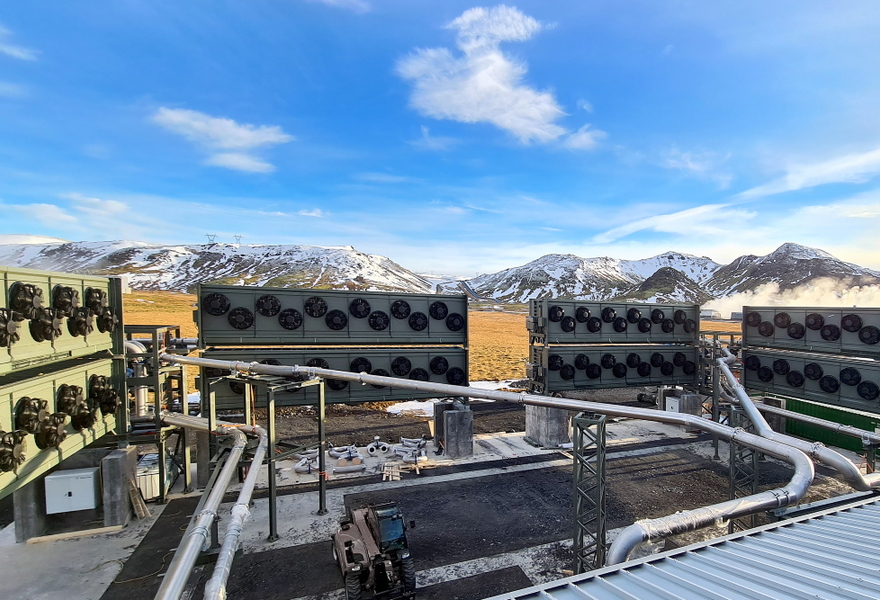Carbon dioxide removal should receive additional financial support
A model study co-authored by MCC, and published in the top journal JEEM, explores optimal pricing of positive and negative emissions of the climate gas CO2.

Air filter pilot plant "Orca" in Iceland: Through "Direct Air Capture", CO2 can be taken straight out of the atmosphere – now it's a matter of incentives so that this might scale up. | Photo: Climeworks
Cleaning up greenhouse gases after they have been emitted should be incentivised by subsidies. New evidence from an economic analysis considering international markets suggests an important reason why subsidies should be higher than the price put on carbon emissions to incentivise their reduction. In a first-of-its-kind model study, researchers analyse policies for removing carbon dioxide from the atmosphere and storing it underground or in products. The suggested different pricing is not due to technological challenges but linked to an economic effect called leakage. The study was conducted by the Berlin-based climate research institute MCC (Mercator Research Institute on Global Commons and Climate Change) and the Potsdam Institute for Climate Impact Research (PIK). It has now been published in the renowned Journal of Environmental Economics and Management (JEEM).
“We are looking at climate pioneers, i.e. countries that are more ambitious in terms of reducing greenhouse gas emissions than others,” says Max Franks from PIK, one of the study’s authors. “We have studied how they should subsidise carbon dioxide removal to make it work, creating a supply of removal technologies and businesses. This question is relevant, for instance, for the climate club recently founded by the G7 group of major industrial countries. To achieve the Paris climate targets, all available options are needed: we must both reduce and remove emissions, carbon removal capacities are limited, and they can compensate for only a certain share of emissions. Accordingly, for policy makers like those of a climate club, what remains to be determined is the best mix of all options and policies – especially given the fact that other countries continue to increase their use of fossil fuel, and markets are interconnected.”
If climate pioneers buy less oil, for example, then the international oil price falls. “Other countries will see a drop in oil prices and therefore might buy more oil,” warns Matthias Kalkuhl, head of the MCC working group Economic Growth and Human Development, who co-authored the study. “Thus, if the more ambitious countries unilaterally reduce carbon emissions by, say, 1,000 tons of carbon, it might lead other countries to increase their emissions by perhaps 150 tons. The original reduction of 1,000 tons is then de facto a reduction of only 850 tons. Thus, we can think of these 150 tons as leaking out through the international oil market.“ Hence the economic term of leakage.
The overall emissions reduction is, therefore, smaller than the emissions reduction in ambitious countries – which is of course bad for our climate. It’s different with carbon dioxide removal. If ambitious countries remove carbon from the atmosphere, it does not affect supply and demand for fossil fuel. Therefore, it also does not affect international fossil fuel prices. This is why it makes sense to subsidise each ton of carbon removal more than the carbon price for emissions.
Assessing economic policies for carbon removal is highly relevant since it is considered to be important for achieving the Paris climate targets. Carbon removal technologies include, for example, afforestation, because trees take carbon out of the air naturally and store it in their framework. Another example is direct air capture, whereby greenhouse gases are sucked directly out of the air and transferred to underground reservoirs. “Our results are particularly important for policy design today and over the next couple of years, where we expect the international climate policy regime to remain fragmented”, co-author Kai Lessmann from PIK explains. “In the long run, of course, we need all countries to cooperate in order to achieve the Paris target of keeping the temperature increase relative to pre-industrial times well below 2 degrees Celsius.”
Reference of the cited article:
Franks, M., Kalkuhl, M., Lessmann, K., 2022, Optimal pricing for carbon dioxide removal under inter-regional leakage, Journal of Environmental Economics and Management
https://www.sciencedirect.com/science/article/abs/pii/S009506962200122X





